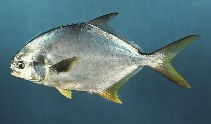| Family: |
Carangidae (Jacks and pompanos), subfamily: Trachinotinae |
| Max. size: |
64 cm TL (male/unsexed); max.weight: 3,760.0 g; max. reported age: 7 years |
| Environment: |
benthopelagic; brackish; marine; depth range 1 - 70 m, oceanodromous |
| Distribution: |
Western Atlantic: Massachusetts, USA through the Gulf of Mexico and scattered localities in the West Indies (Ref. 26938) to Brazil. Also found in Argentina (Ref. 44847). Absent from clear waters of Bahamas and similar islands (Ref. 7251). |
| Diagnosis: |
|
| Biology: |
Adults occur in coastal waters, commonly entering bays and estuaries. Juveniles found in sandy beaches exposed to wave action (Ref. 5217). Adults are absent from insular areas with coralline habitats (Ref. 5217). They generally form small to large schools. They feed on mollusks, crustaceans and other invertebrates and small fish. Excellent food fish (Ref. 9626). Highest priced marine food fish in the USA (Ref. 171). Have been reared in captivity (Ref. 35420). |
| IUCN Red List Status: |
Least Concern (LC); Date assessed: 21 August 2012 Ref. (130435)
|
| Threat to humans: |
harmless |
Source and more info: www.fishbase.org. For personal, classroom, and other internal use only. Not for publication.
